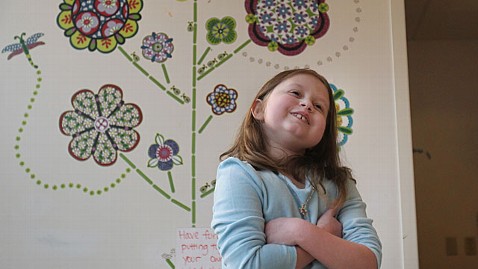Maine Girl Gets Rare Six-Organ Transplant

Alannah Shevenell, 9, will be leaving Children's Hospital Boston after undergoing a six-organ transplant. (Suzanne Kreiter/The Boston Globe/Getty Images)
A 9-year-old girl from Maine is heading home today three months after receiving a six-organ transplant at Children's Hospital Boston.
Alannah Shevenell of Hollis, Maine., got a new esophagus, liver, stomach, spleen, pancreas and small intestine after losing her own to a myofibroblastic tumor.
"We needed to remove all the organs because the tumor had grown to basically encircle the blood supply," said Dr. Heung Bae Kim, director of the hospital's Pediatric Transplant Center.
Chemotherapy didn't work, and smaller surgeries were no match for the sprawling tumor. Shevenell couldn't eat because the tumor was squeezing her esophagus. The multi-organ transplant was her last hope, but she had to wait a year for a suitable donor.
"Especially for children, finding a donor who has organs in good shape and the right size is a real challenge," said Kim. But on October 27, Shevenell's family got the call: They found a donor, and her transplant would be the next day.
Kim led a team of surgeons, nurses and anesthesiologists through the grueling 14-and-a-half hour procedure, which he called "the most extensive" transplant procedure he's ever done.
"We spent about two-thirds of the time removing the tumor from the organs we were leaving," he said, describing how he peeled the tumor off Shevenell's aorta - the thick vessel carrying blood from the heart to the rest of the body. "And we had to do a fair bit of kidney reconstruction."
The team transplanted the new organs in as a package and waited for them to take over.
"We were so happy," Kim said of the result. "It was technically very successful. The organs looked good."
Because Shevenell's tumor made it impossible for her to eat, she got used to being fed through a feeding tube into her stomach.
"It had been so long that she lost her appetite," said Kim. "But on the weekend she started eating again. And yesterday she had some cake."
Although Shevenell is heading home, she'll need frequent check-ups throughout her life.
"There is a risk that she'll need another transplant down the road. And if there were any tumor cells left behind, there is a risk it could come back," said Kim.
Shevenell will also need to take anti-rejection drugs for the rest of her life.
"Aside from those medications, children usually do quite well and lead normal lives," said Kim. "And she's a spunky little kid."